Genesys Cloud CX is a leading cloud based contact center platform known for its omnichannel support and advanced features. However, it’s not a one size fits all solution.
Many businesses seek a Genesys alternative due to factors like cost, complexity, or missing capabilities. For example, Genesys can be expensive for small teams, and some advanced analytics or AI features are only available as paid add-ons.
Genesys also lacks certain functionalities out of the box – such as full end to end encryption security, built in video conferencing, and a broader range of auto dialing modes – which some competitors provide. If Genesys’ offerings don’t fully match your needs or budget, it’s wise to explore other Genesys competitors in the market.
Below, we present a comparison of the top Genesys alternatives. We’ll then dive into detailed insights on 7 of the best Genesys competitors, including their strengths, unique features, and ideal use cases.
Genesys Competitors at a Glance
To help you scan the field, here’s a glance comparison of seven leading Genesys alternatives and what they excel at:
| Genesys Alternative | Key Strength/Focus | Best For |
|---|---|---|
| SuperU (AI Voice CCaaS) | AI voice agents, quick template based deployment, ultra low usage pricing | Businesses seeking an affordable, AI voice contact center that automates routine queries and scales easily |
| Nextiva (CX Suite) | All in one communications (UCaaS + CCaaS), built in CRM, easy workflow automation | Teams wanting a unified platform for phone, contact center, and CRM – ideal for SMBs and enterprises needing seamless integration |
| NICE CXone (Contact Center) | AI powered self service (IVA/chatbots) and analytics, broad omnichannel support at lower cost tiers | Large enterprises requiring advanced AI and analytics, or smaller teams on a budget that need digital channels without voice |
| Five9 (Cloud Contact Center) | Advanced AI features (real time agent assist, AI call summaries), robust workflow automation | Enterprises with high call volumes that need strong workforce management and AI driven assistance tools (and are willing to invest for premium features) |
| Talkdesk (CCaaS) | Highly customizable and modern interface, innovative AI capabilities | Companies seeking a flexible, Genesys Cloud alternative with easy integration into existing systems (great for industries like finance or healthcare with custom needs) |
| Avaya (Unified Communications) | Hybrid and on premise deployment options, rich telephony heritage, broad suite (voice, video, UC) | Organizations that require on premises or hybrid contact center solutions or those with existing Avaya infrastructure (looking for a Genesys vs Avaya upgrade path) |
| Aircall (Voice Contact Center) | Simple setup, intuitive interface, focus on voice calling with AI voicemail transcription, very affordable plans | Small businesses and startups that need a basic, budget friendly voice support solution without the complexity of a full omnichannel platform |
CCaaS = Contact Center as a Service, UCaaS = Unified Communications as a Service.
Now, let’s explore each of these Genesys alternatives in depth, including their core strengths and which scenarios they fit best.
1. superU – AI Voice Solution (Best Overall Genesys Alternative)

SuperU is an AI driven contact center platform that distinguishes itself with AI voice agents and an extremely easy deployment process. It comes with industry specific templates that allow you to get up and running quickly, without the heavy setup that Genesys might require.
SuperU’s AI voice agents can handle repetitive customer queries through natural language interactions, freeing up human agents to focus on more complex issues.
When a call or query becomes too complex, the system seamlessly transfers it to a live agent, ensuring customers get human assistance when it’s most needed.
Strengths and Key Features:
- SuperU’s biggest strength is its conversational AI voice bots, which serve as virtual agents to answer common questions or perform routine tasks (think password resets, balance inquiries, order statuses, etc.).
- This capability is similar to the AI bots offered by top competitors like NICE CXone – it can deflect simple queries and only escalate complex problems to humans, improving efficiency.
- SuperU also offers ready made templates for different industries (e.g. banking, healthcare, e commerce), so you don’t have to build workflows from scratch – a contrast to Genesys, which often requires more customization effort.
- Another advantage is cost: instead of pricey per seat monthly licenses, SuperU uses a usage based pricing model (around $0.05 per minute or lower at volume), which can be far more affordable for teams that handle a lot of calls.
- This pay as you go pricing means you pay only for what you use, potentially reducing the total cost of ownership versus Genesys’ user license model.
Ideal For:
- SuperU is the best Genesys alternative for organizations that want to leverage AI to improve their call handling while keeping costs low.
- If your call center deals with a high volume of repetitive inquiries, SuperU will excel by automating those interactions with voice AI – customers get quick answers, and your human agents stay free for the issues that truly need a human touch.
- It’s also ideal for businesses that need to deploy a contact center quickly and without extensive IT resources, thanks to those pre-built templates and simple configuration.
- In short, if you’re looking to modernize your customer service with AI voice technology, SuperU offers a faster and more cost effective path than Genesys. (SuperU is a newer entrant, so it may not have the same brand recognition as Genesys, but its focused feature set makes it a top competitor in terms of value.)
Genesys vs SuperU:
- Genesys Cloud CX does offer AI features like chatbots and voicebots, but they often require add ons and can be complex to implement fully.
- SuperU, on the other hand, bakes AI voice capabilities into its core offering, making them accessible from day one.
- Also, Genesys pricing is typically per agent per month, which can quickly add up, whereas SuperU’s $0.05/min usage pricing can dramatically cut costs for many use cases.
- For a company seeking an efficient, AI enabled Genesys Cloud competitor, SuperU provides a compelling combination of simplicity, intelligence, and affordability.
2. Nextiva – Unified Communications & Contact Center in One
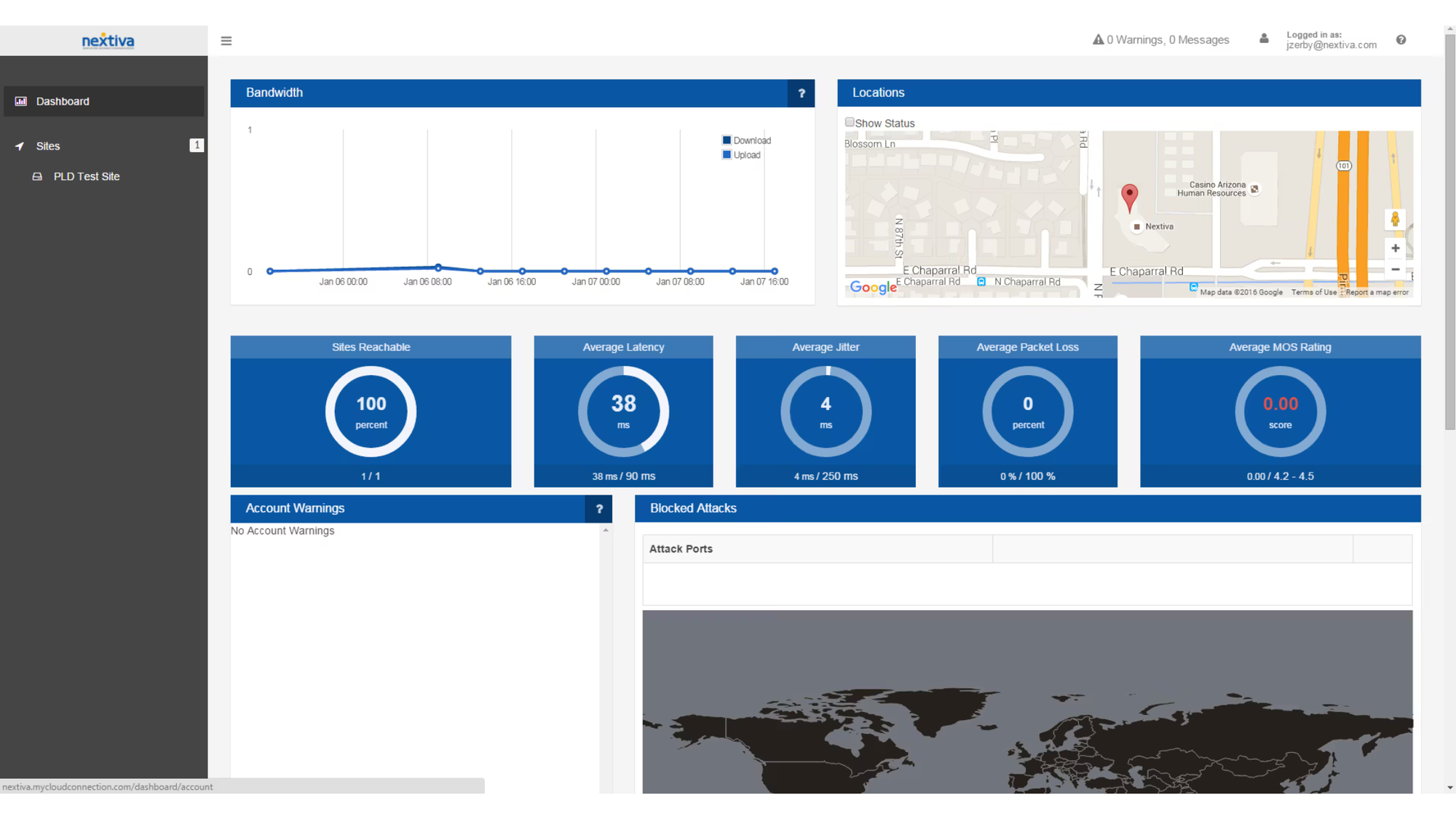
Nextiva offers a unified platform combining VoIP phone service, team messaging, video conferencing, and a full fledged contact center.
As a Genesys alternative, Nextiva shines in its all in one approach – it includes an integrated CRM and user friendly workflow automation, which Genesys lacks natively.
Nextiva’s Contact Center suite supports single channel (voice) or omnichannel interactions with AI features like IVR bots and speech analytics.
Notably, Nextiva allows drag and drop design of call flows and chatbots similar to Genesys, but also provides a native CRM for customer data. (Genesys relies on integrations for CRM functionality.)
Strengths:
- Nextiva is often lauded for its ease of use and quick deployment. Its pricing is straightforward and feature rich at each tier, which means even a basic Nextiva plan comes loaded with capabilities that might require higher tiers or add ons in Genesys.
- For example, Nextiva includes auto dialers, workflow automation, and AI assistants even in its lower tier plans, whereas Genesys reserves some advanced dialer modes and analytics for higher editions.
- Nextiva also offers features like call transcription, AI powered customer journey analytics, and a Secure Payment assist feature (for taking payments during calls) which are not all present in Genesys out of the box.
- Importantly, Nextiva’s unified platform means your contact center and business phone system work seamlessly together – something beneficial if you want a single vendor for all communications.
Ideal For:
- Nextiva is ideal for organizations – especially small to mid sized businesses (SMBs) – that want a unified communication and customer service platform.
- If you’re looking to improve customer experience without juggling multiple tools, Nextiva can be a great fit.
- It’s also a strong choice if you value easy setup and support; Nextiva emphasizes 24/7 customer support and has a reputation for being user friendly for agents and admins alike.
- Companies that want built in CRM capabilities or an all in one bundle (instead of integrating Genesys with separate PBX or CRM systems) will find Nextiva a compelling Genesys competitor.
- However, keep in mind Nextiva’s plans can be slightly pricier than some others for purely contact center use, which is the trade off for including so many features.
Genesys vs Nextiva:
- Both platforms offer omnichannel contact center functionality, but Genesys is highly robust, but can be complex and may require third party add ons for a complete solution.
- Nextiva provides a more streamlined, out of the box experience with unified communications, making it attractive for teams that want to “go live” quickly with minimal IT overhead.
- In practice, if Genesys feels too complicated or fragmented, Nextiva’s consolidated approach could be a better fit.
3. NICE CXone – AI and Omnichannel Focus
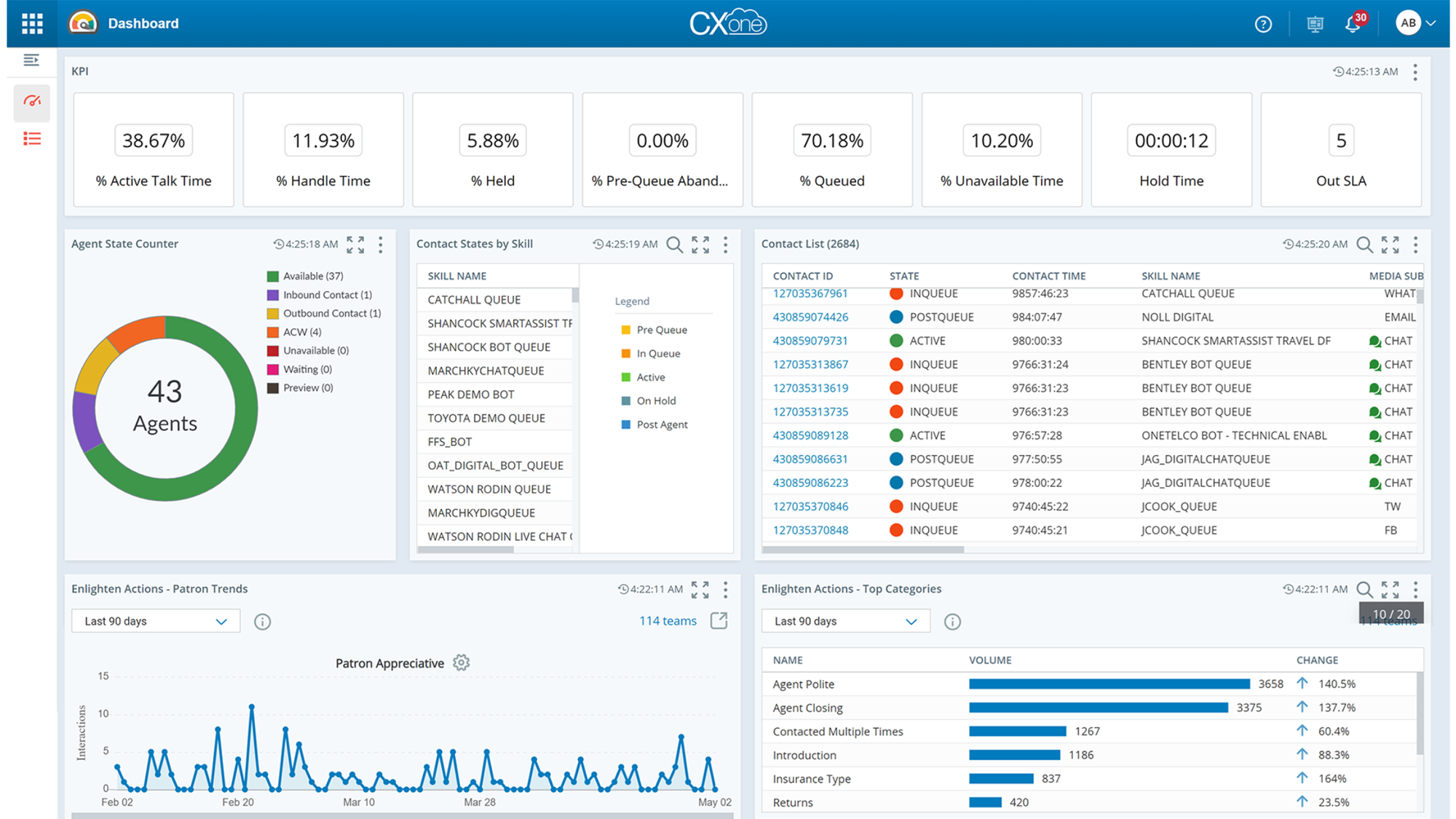
NICE CXone (formerly inContact) is a direct Genesys competitor that often goes head to head in large contact center deployments.
It offers a comprehensive CCaaS platform that unifies voice, email, SMS, social messaging, and chat on a single interface.
One of NICE’s standout strengths is its emphasis on AI driven self service and analytics. For example, NICE includes no code chatbots and voice bots that can handle routine inquiries (password resets, balance checks, status updates, etc.) via its “Conversational AI” features.
It also provides strong workforce engagement tools and analytics dashboards powered by AI to gauge customer sentiment and agent performance.
Strengths:
- A key advantage of NICE CXone is value for money in certain areas. Genesys vs NICE often comes down to channel availability and cost – notably, NICE’s entry level plans are digital only and support 30+ channels, whereas Genesys’ lowest tier is voice only.
- This means a small business that primarily needs digital channels (chat, SMS, social) could opt for an affordable NICE plan and get a wide channel mix, which wouldn’t be possible with Genesys without higher packages.
- NICE also leads in AI for workforce management: it can forecast staffing and schedule agents using AI, similar to Genesys’ workforce tools, but with a slightly more modern twist in features like Enlighten AI Copilot for agents.
- Additionally, NICE has a huge global presence and offers professional services and consulting, beneficial if you need hands on help implementing complex contact center workflows.
Ideal For:
- Large enterprises and organizations with complex, omnichannel needs often find NICE CXone to be an excellent Genesys alternative.
- It’s well suited for businesses that want to implement customer self service at scale (through AI bots and IVR) and require rich analytics on customer interactions.
- For example, if you want to analyze customer sentiment across calls and messages, NICE’s built in tools are very strong.
- It’s also a good fit for companies on a tighter budget that don’t need voice calls – the digital package provides robust contact center capabilities without paying for telephony.
- However, note that some of NICE’s most advanced features (like certain AI assistants) may come as add ons at extra cost, so plan your requirements accordingly.
Genesys vs NICE:
- In this comparison, both are feature rich for the contact center, but there are a few key differences. Genesys is often seen as slightly more expensive for multi channel support at the low end, since its basic plans are limited.
- NICE can claim a cost edge for digital channels and has equally robust IVR/AI capabilities, making it a better Genesys Cloud alternative for organizations prioritizing omnichannel self service.
- On the flip side, Genesys has a longer pedigree in certain large call center environments, but with recent innovations, NICE CXone is on par and sometimes ahead (for instance, offering no code AI bots and out of the box sentiment analysis).
4. Five9 – AI Driven Analytics and Workforce Management
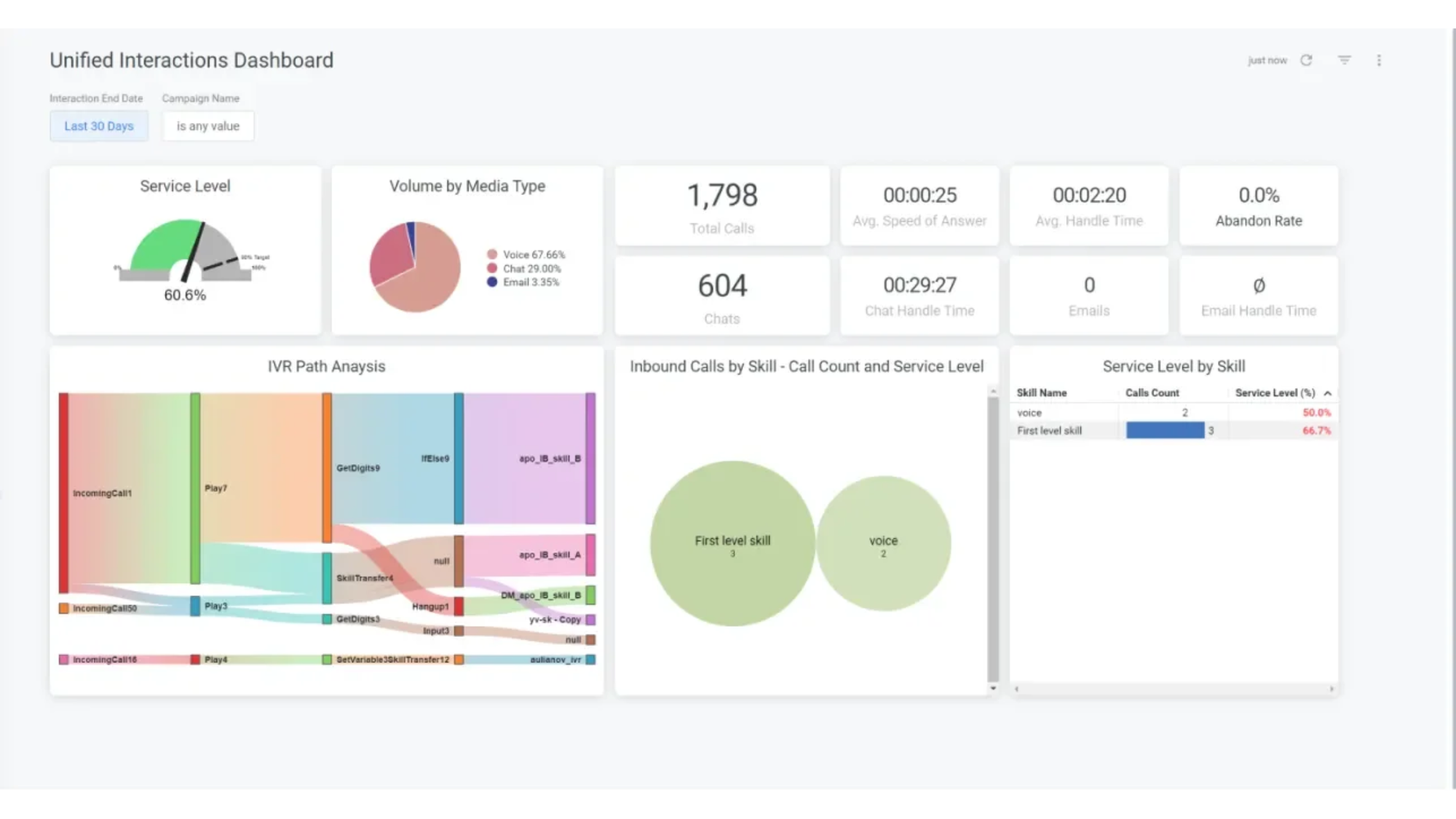
Five9 is a cloud contact center platform that, like Genesys, caters to businesses with serious customer service operations.
It provides voice, video, email, SMS, and social channels in an integrated solution. Five9 has invested heavily in AI features – notably their Agent Assist and AI Summaries – which are comparable to Genesys Cloud’s AI capabilities, but with a more polished agent facing interface.
In fact, Five9’s agent desktop is often praised for being more user friendly than Genesys’, offering real time “guidance cards” that give agents suggestions, checklists, and next best actions during calls.
Strengths:
- Five9 brings a few distinctive strengths to the table. Its workflow automation is robust – Five9 includes a drag and drop workflow designer for IVR and virtual agent flows, making it relatively easy to build custom call routing and self service menus.
- This is similar to Genesys Composer flows, but users often find Five9’s interface straightforward. Five9 also excels in workforce management (WFM) features: scheduling, forecasting, and even gamification.
- Genesys and Five9 both offer WFM, but Five9 goes further with built in gamification tools like agent leaderboards, challenges, and even game like elements to engage agents.
- This can boost agent morale and performance, something Genesys doesn’t emphasize as much. Additionally, Five9’s AI can transcribe calls in real time, provide recommended agent responses, and automatically summarize calls – handy for quality assurance and training.
Ideal For:
- Five9 is ideal for medium to large enterprises that need advanced functionality and are willing to invest in a premium solution.
- If your contact center strategy prioritizes cutting edge AI assistance for agents or if you require strong analytics and reporting across all channels, Five9 is a top contender.
- It’s especially beneficial for organizations focused on workforce efficiency and training – for instance, call centers that want to use gamification to motivate agents or need detailed, real time dashboards company wide.
- Keep in mind that Five9 is one of the pricier alternatives (its base plan costs as much as some competitors’ higher tier plans). Thus, it’s best for those who will fully utilize its rich feature set.
- If budget is your main concern, an option like Aircall might be more suitable, but it won’t match Five9 in depth of features.
Genesys vs Five9:
- Both Genesys and Five9 are high end solutions with comparable channel support and AI capabilities.
- The choice often comes down to user experience and cost. Five9’s interface and agent guidance tools are frequently cited as more sophisticated and intuitive than Genesys Cloud’s, which can shorten training time and improve agent performance.
- Genesys, however, integrates with a vast ecosystem of CRM and other apps (hundreds of integrations) which can be a plus if you rely on a particular tech stack.
- In summary, if you want a Genesys alternative that emphasizes agent facing AI and analytics – and you don’t mind a premium price – Five9 is a leading option. It delivers nearly everything Genesys does, and in some areas (like guided agent assist and gamification) it arguably does it better.
5. Talkdesk – Customizable and Modern CCaaS Platform
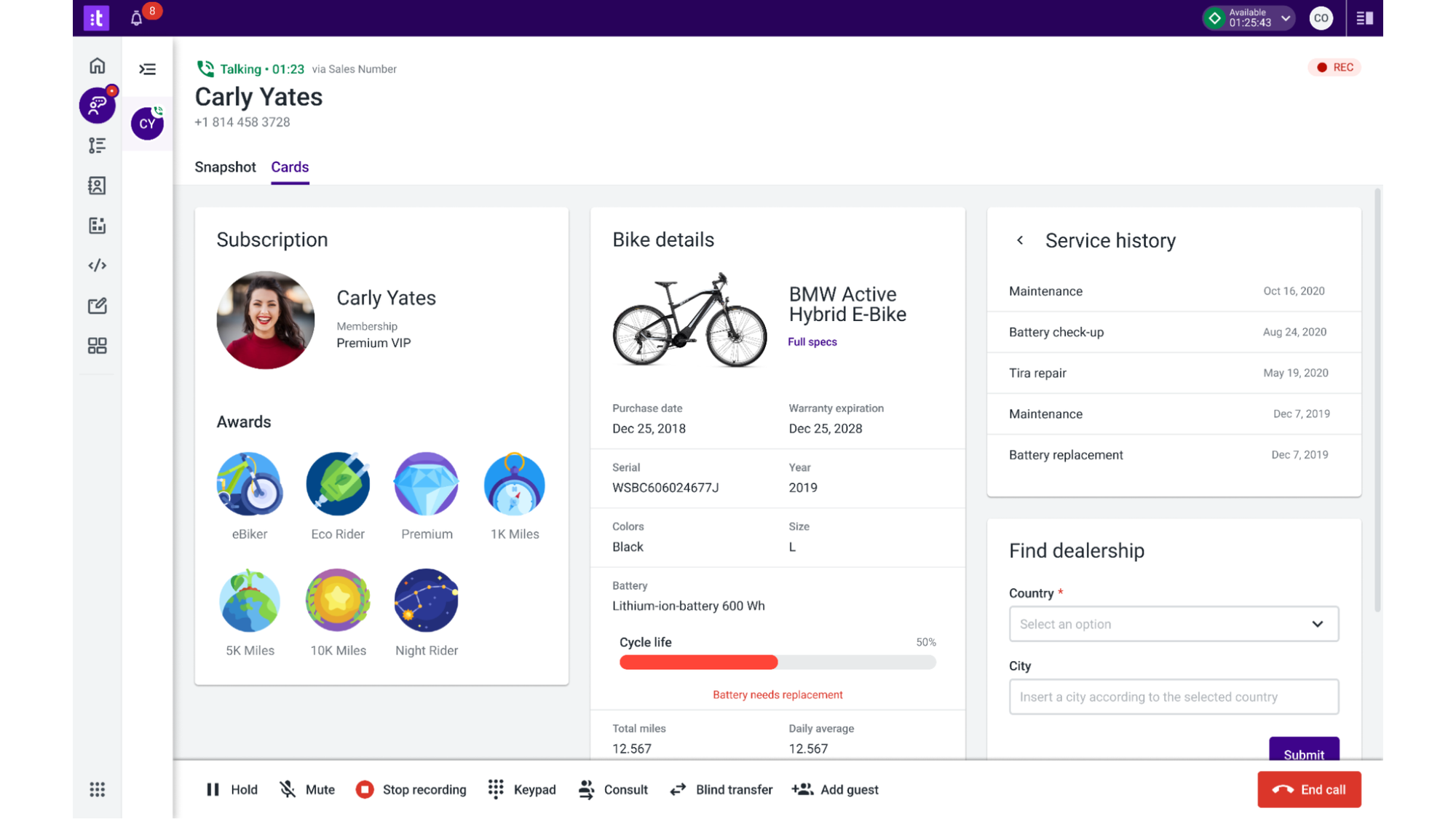
Talkdesk is another cloud native contact center platform and a strong Genesys competitor, known for its modern UX and flexibility.
Talkdesk offers voice, SMS, chat, email, and integrations with social channels, similar to Genesys. One of Talkdesk’s differentiators is its highly customizable agent workspace – users can tailor the interface and modules to fit their workflows.
Talkdesk also invests in AI: it provides AI based routing, virtual agents, and offers an “AI Trainer” tool to continually improve its machine learning models. In terms of pricing and scale, Talkdesk is often close to Genesys (its plans range from roughly $85 to $140 per user/month, comparable to Genesys Cloud tiers).
Strengths:
- Talkdesk stands out for innovation and usability. It’s frequently praised for a clean, intuitive interface that appeals to teams who find older systems clunky.
- Younger agents or tech savvy teams tend to like Talkdesk’s user experience. The platform’s customizability is another plus: Talkdesk has an app marketplace and open APIs, so you can extend its functionality or integrate it easily with CRM, workforce management, or other tools.
- Talkdesk readily integrates with big names like Salesforce, Microsoft Teams, Zoom, etc., allowing it to slot into your existing infrastructure smoothly.
- This makes it a good choice if you have a separate PBX or UC system – you can use Talkdesk purely as your contact center and connect it to your phone system or collaboration tools.
Features wise
Talkdesk covers all the essentials: skills based IVR routing, real time and historical reporting, call recording, and optional add ons like WFM. Its AI features (called “Talkdesk AI” suite) provide capabilities like voice analytics and agent assistance, bringing it on par with Genesys in the AI arena.
Ideal For:
- Talkdesk is a great Genesys alternative for companies that need a flexible, customizable solution – for example, if you want to deeply integrate your contact center with other business systems or you require custom routing and bespoke workflows.
- Industries like finance, healthcare, or any with unique processes often appreciate Talkdesk’s adaptability. It’s also well suited for businesses that prioritize user experience for agents.
- If agent adoption and ease of use are concerns with Genesys (which some find complex or overwhelming), Talkdesk’s simpler interface can be a relief.
- Additionally, Talkdesk can be deployed as a standalone CCaaS that complements an existing PBX/UC environment, so it’s ideal if you already have a phone system but need advanced contact center capabilities on top of it.
Genesys vs Talkdesk:
- In a direct comparison, both provide similar core functionality, but Talkdesk often wins on ease of implementation and interface polish.
- Genesys might have a slight edge in extremely large, complex deployments (given its long enterprise heritage), whereas Talkdesk is a bit newer and sometimes more agile with feature updates.
- Cost wise they are in a similar bracket, although Talkdesk’s add ons (like WFM) are optional, which gives you flexibility to pay only for what you need (Genesys bundles some features by tier).
- If Genesys feels too rigid or costly for what you use, Talkdesk’s modular approach and modern design make it a compelling alternative.
6. Avaya – Hybrid Contact Center Solutions from a Telecom Veteran
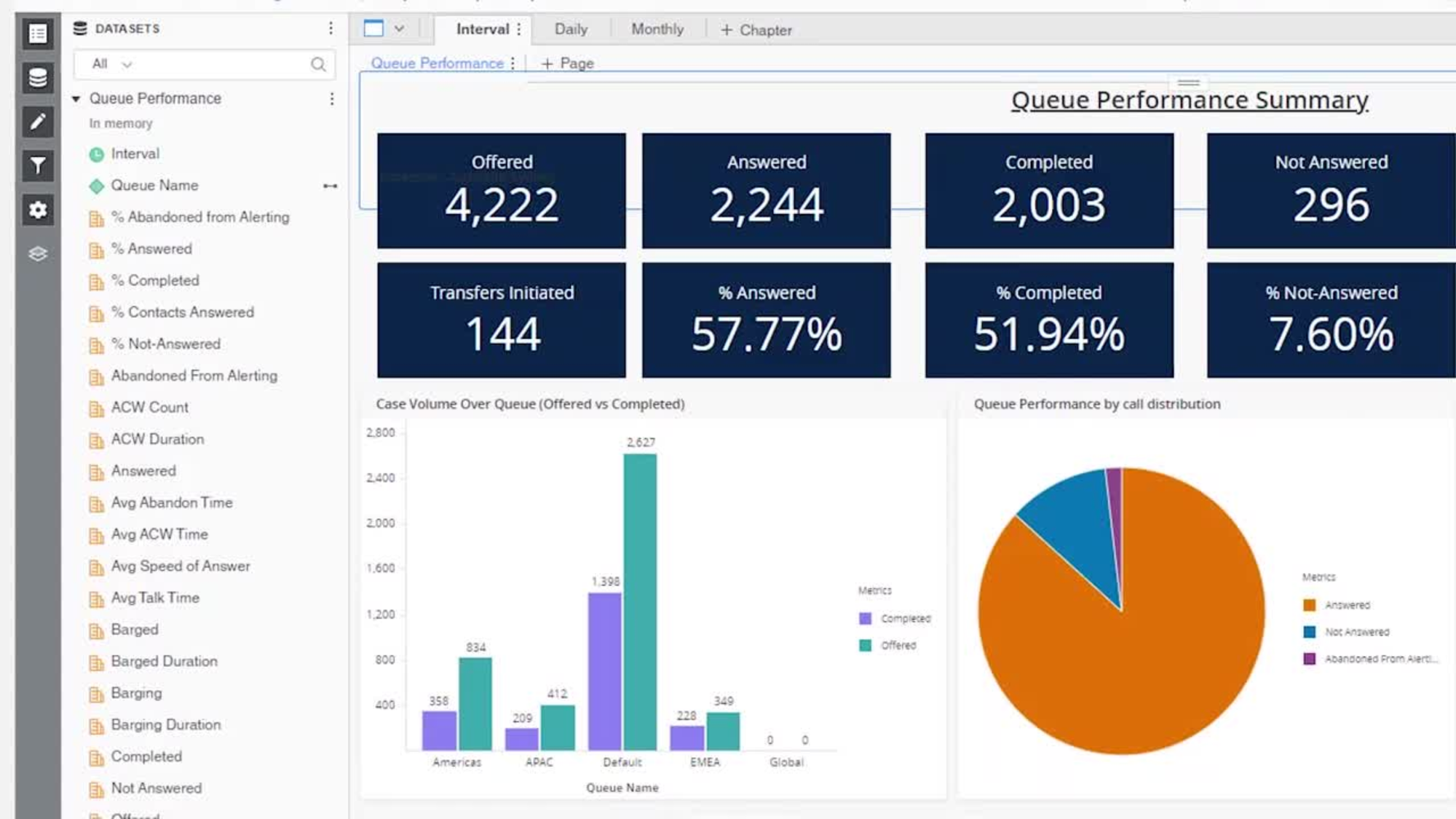
Avaya is a longtime leader in telecom and call center systems, now offering both on premise and cloud contact center solutions.
Many know Avaya for its PBX phone systems, but it also provides Avaya OneCloud CCaaS for contact centers. Avaya’s strength as a Genesys alternative lies in its flexibility of deployment and its broad suite of communications tools.
Unlike Genesys Cloud (which is purely cloud based), Avaya can deliver on premises, hybrid, or cloud models depending on customer needs.
Strengths:
- An Avaya contact center can include voice, email, SMS, and even video conferencing and unified communications integrated together.
- In fact, Avaya provides native UCaaS (unified communications) capabilities like team messaging and video meetings alongside the contact center – something Genesys typically does not offer natively.
- For an enterprise already using Avaya for telephony, adding their contact center can be relatively seamless and often comes with bundled discounts.
- Avaya’s platform supports advanced features like skills based routing, outbound dialing, and workforce optimization, comparable to Genesys.
- They also have a large partner network and offer professional services, so customers who need a lot of hands on support or custom integrations might benefit from Avaya’s ecosystem.
- Finally, Avaya’s on prem and hybrid options stand out: if your organization requires that customer interaction data stay on site (for compliance or preference), Avaya can accommodate that in ways Genesys Cloud might not (Genesys does have an on prem solution, Genesys Engage, but that’s a different product line).
Ideal For:
- Avaya is best for large enterprises and any organization with legacy infrastructure or on prem requirements.
- If you’re an existing Avaya PBX customer, Avaya’s contact center is an obvious alternative to consider when looking to upgrade, as it allows you to leverage what you already have and avoid a rip and replace.
- It’s also suitable for companies that want a full communications suite – telephony, UC, and contact center – under one roof.
- For example, a big corporation might use Avaya for internal communications (phones, video meetings) and extend the same system to handle customer contacts, simplifying vendor management.
- Additionally, sectors like government or finance, which sometimes mandate on premise solutions for security, may opt for Avaya to get a modern contact center while keeping data in house.
Avaya vs Genesys:
- When comparing Avaya vs Genesys, a lot comes down to deployment and ecosystem. Genesys Cloud is exclusively cloud (with monthly subscriptions per user), whereas Avaya offers more deployment flexibility (subscription or license, cloud or on site).
- Genesys has been a frontrunner in pure cloud contact centers with a rich feature set, but Avaya’s solutions have caught up in functionality and can appeal to those wanting a unified communications approach.
- Avaya might not have the same level of AI capabilities out of the box as Genesys Cloud CX or others (their AI often comes via partnerships or add ons), but they excel in reliability and telephony expertise.
- If your business scenario requires a hybrid model or you value continuity with existing telecom systems, Avaya is a formidable Genesys alternative that can deliver a full featured system on your terms.
7. Aircall – Simple, Affordable Call Center for SMBs
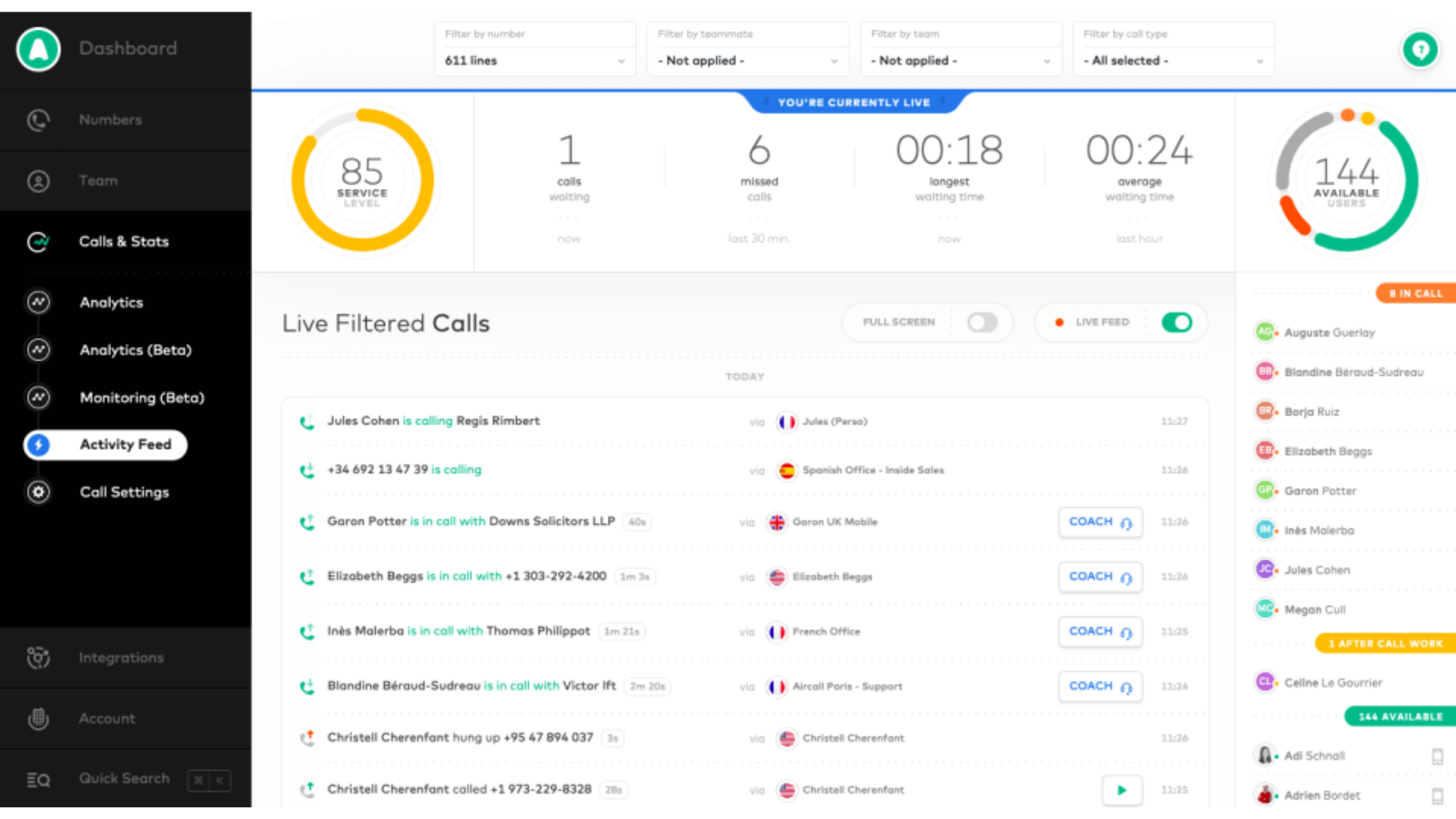
Aircall focuses on voice and SMS as the primary channels, making it a lighter alternative to Genesys Cloud if you don’t need a full omnichannel suite.
Aircall’s appeal is its simplicity and cost effectiveness. It provides essential call center features – like call routing, IVR menus, call queueing, voicemail, and live call monitoring – through an easy to use interface, without the complexity that a large system like Genesys might have.
Aircall also integrates with popular CRM and helpdesk tools (Salesforce, HubSpot, Zendesk, etc.) to bring caller info to agents, akin to how Genesys integrates with CRMs.
Strengths:
- The main strengths of Aircall are ease of setup, intuitive design, and price. You can literally get Aircall up and running in a day, which is a stark contrast to the lengthy implementations sometimes required for Genesys.
- The system is very user friendly, so agents and admins can learn it quickly with minimal training. Aircall also has some modern touches like AI powered voicemail transcription and call tagging, which help with reviewing calls and maintaining quality records.
- While it doesn’t boast advanced AI bots or analytics like Genesys, it does offer useful basics – for instance, real time call monitoring and whisper/barge features for supervisors to coach agents live.
- Another big plus: cost. Aircall’s plans are significantly cheaper than most Genesys Cloud plans, with pricing roughly around $30–$50 per user/month.
Limitations:
- It’s worth noting that Aircall is limited to telephony and SMS channels – it does not natively handle email, web chat, or social media in the way Genesys or other larger competitors do.
- If your customer support strategy requires true omnichannel engagement, Aircall by itself would not suffice (you’d need to use it alongside other tools).
- It also lacks some advanced capabilities like built in workforce management or AI analytics that Genesys alternatives like Five9 or Nextiva offer. However, these omissions are often acceptable for smaller operations that just need a solid inbound and outbound calling system.
Ideal For:
- Aircall is ideal for small businesses, startups, or any team that primarily relies on phone calls and wants a quick, low fuss setup.
- If you find Genesys too overwhelming or costly for your scale, Aircall can cover the fundamental needs of a call center at a fraction of the price.
- It’s great for sales teams or support teams that mainly communicate by phone and text. Also, companies that want to integrate calling into their CRM workflows easily will appreciate Aircall’s one click integrations.
- For example, a sales team using HubSpot or a support team using Zendesk can use Aircall to dial out and log calls automatically, boosting productivity.
Genesys vs Aircall:
- Genesys offers far more in terms of channels, automation, and customization – but with that comes higher complexity and cost.
- Aircall strips the contact center down to the essentials for voice communication, making it extremely easy and affordable.
- If you require a broad feature set and multiple channels, Genesys (or another larger competitor) wins hands down.
- But if your operation is phone centric and you value simplicity, Aircall is a Genesys alternative that can save you money and headaches.
For businesses, looking to enhance their digital presence, expert digital marketing Stockport services that can complement your AI driven customer engagement strategies.
Wrap Up: Choosing the Right Genesys Alternative
Finding the best contact center platform comes down to your specific needs, budget, and technical requirements. Genesys Cloud CX is a powerful solution, but as we’ve seen, it has worthy competitors that can outperform it in various areas – whether it’s easier deployment, lower cost, AI innovations, or multi channel flexibility.
In summary, all the competitors we discussed can succeed as a replacement for Genesys, but SuperU stands out as the best Genesys alternative for many scenarios. It combines the strength of AI driven automation with ease of use and affordable pricing, addressing some of Genesys’s biggest pain points (complexity and cost) head on.
Want fewer repetitive calls? Book a demo.


